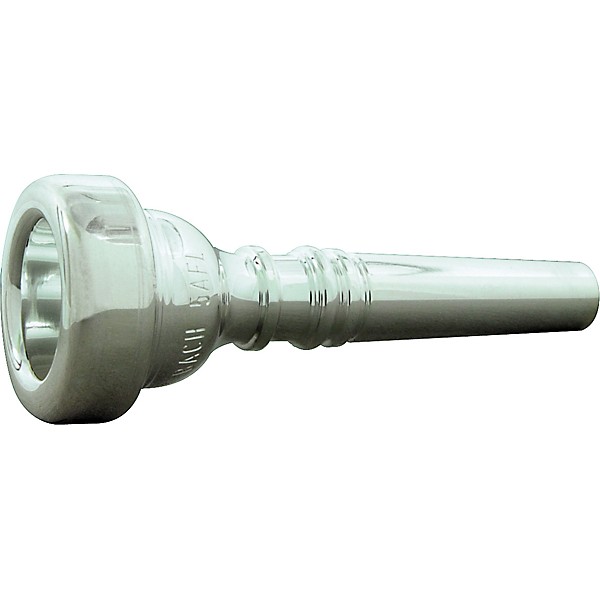Gear SpecialistBundlingMusician
Open Box
Blemished
Open Box Bach Flugelhorn Mouthpiece Regular Level 2 3C 197881055233
(0)|Q&A|Item #:462986005901054
Condition: Open Box - Blemished
6-month special financing^ + $2 back in Rewards** Limited time Learn More
Save on orders $199+ and get expert advice from a Gear Adviser
Need Help?

Description
A carefully selected Bach mouthpiece can help improve a flugelhorn player's embouchure, attack, tonguing and endurance.
Vincent Bach was a rare combination of artist and engineer. A mechanical genius and acclaimed trumpet soloist, his instruments and mouthpieces are used today in every major studio and orchestra in the world. Bach personally designed the tools and composed the plans that continue to set the high standards for making all Bach products today.
"Choosing the perfect mouthpiece is often more difficult than choosing the perfect instrument. Your success as a musician depends on the choice of equipment that will do justice to your capabilities."
-Vincent Bach
Vincent Bach was a rare combination of artist and engineer. A mechanical genius and acclaimed trumpet soloist, his instruments and mouthpieces are used today in every major studio and orchestra in the world. Bach personally designed the tools and composed the plans that continue to set the high standards for making all Bach products today.
"Choosing the perfect mouthpiece is often more difficult than choosing the perfect instrument. Your success as a musician depends on the choice of equipment that will do justice to your capabilities."
-Vincent Bach
Features
- Model No. / Depth of Cup / Approx. Cup Dia. / Rim Shape / Description
- 1* / Deep / 17.50 mm / Medium thin. / Extra-large cup for players with a robust embouchure. Produces a great volume of tone.
- 1C* / Medium / 17.00 mm / Medium wide. / Large diameter, medium cup ” good for all-around use.
- 1-1/4C / Medium / 17.00 mm / Medium wide. / Large cup for powerful trumpeters. Compact tone of great carrying power.
- 1-1/2C* / Medium / 17.00 mm / Medium wide, not too sharp. / Large diameter, medium cup ” good for all-around use.
- 2C / Medium / 16.50 mm / Medium wide, lowered toward the outside. / Large cup; powerful, brilliant tone. For players with a good embouchure.
- 2-1 2C / Medium / 16.40 mm / Medium wide, lowered toward the outside. / Large cup; brilliant, heroic, crisp C trumpet tone. For players with strong, muscular lips.
- 3 / Deep / 16.30 mm / Medium wide. / Fairly large cup with full, rich tone.
- 3B / Medium deep / 16.30 mm / Medium wide. / A fairly large cup. The tone is warm and full.
- 3C* / Medium / 16.30 mm / Medium wide. / Fairly large cup, good for all-around use.
- 5A* / Very deep / 16.25 mm / Medium wide, rounded inside edge. / A fairly large cup with a dark, full, mellow tone.
- 5B* / Medium deep / 16.25 mm / Medium wide, lowered toward the outside. Medium sharp edge. / A precise rim and a fairly large cup. The tone is vivid and full.
- 5C* / Medium / 16.25 mm / Medium wide, well rounded toward the inside and outside, fairly flat. / For players with a strong embouchure who do not like a sharp edge. The tone is lively and rich.
- 6C* / Medium / 16.20 mm / Medium wide, not too sharp, rather flat. / A distinctive C trumpet cup. Its clear tone cuts through the largest bands and orchestras.
- 7* / Deep / 16.20 mm / Medium wide, lowered toward the outside. Med. sharp inside edge. / This popular model produces a colorful, liquid tone which is uniform over the entire scale. Desirable for all-around work.
- 7A* / Very deep / 16.20 mm / Medium wide, lowered toward the outside. Med. sharp inside edge. /
- Warm, melodious, rich tone approaches the quality of a lyric
- soprano voice. Free blowing.
- 7C* / Medium / 16.20 mm / Medium wide, lowered toward the outside. Med. sharp inside edge. Well-rounded edge with a perfect grip. /
- Probably the most widely used model in the world.
- Its brilliant tone is preferred by school musicians and by artists.
- 10 / Deep / 16.00 mm / Fairly wide with rather broad, flat surface. / Similar to No. 7, but smaller in size and with a broad, flat rim. Suitable for players with fleshy, soft lips.
- 10-1/2C* / Medium / 15.90 mm / Medium wide. / Fine high register, resonating low register. Particularly useful to players without a strong embouchure. Ideal for C trumpet.
- * Bach flugelhorn mouthpieces are regularly stocked in those model numbers marked with an asterisk in the chart (all other standard Bach trumpet rim sizes are available on special order). They have identical rims, but deeper, fluegelhorn-style cups, a larger throat and backbore. The deeper cups produce a dark tone of lyric quality. Their fundamental component is intense; the upper partials are reduced to a minimum. Do not attempt to play fluegelhorn with a refitted cornet or trumpet mouthpiece as you will be more likely to play out of tune and not get the rich sound characteristic of the fluegelhorn.




